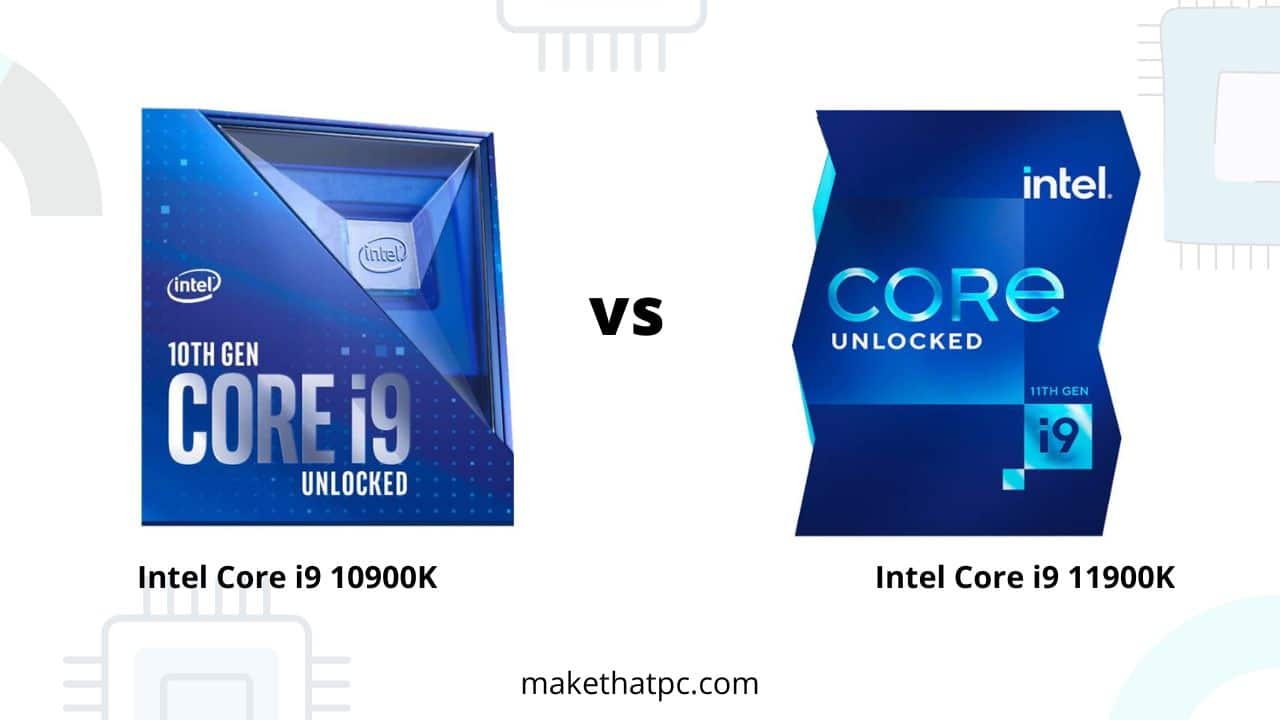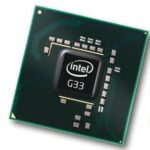The Intel Core i9-10900K is a 10-core, 20-thread processor based on the Comet Lake architecture. It has a base clock speed of 3.7 GHz and a boost clock speed of up to 5.3 GHz. It also has 20 MB of Intel Smart Cache and supports DDR4 memory.
The Intel Core i9-11900K is an 11-core, 22-thread processor based on the Rocket Lake architecture. It has a base clock speed of 3.5 GHz and a boost clock speed of up to 5.3 GHz. It also has 20 MB of Intel Smart Cache and supports DDR4 memory.
In terms of performance, the Core i9-11900K is generally considered to be slightly faster than the Core i9-10900K, due to its higher core count and better overall performance in multi-threaded workloads. However, the Core i9-10900K has the advantage of higher clock speeds, which can provide a boost in single-threaded tasks and some multi-threaded workloads.
Overall, the Core i9 10900K and Core i9 11900K are both powerful processors that offer fast and efficient performance for demanding tasks. However, the Core i9 10900K has a higher number of cores and threads, as well as a higher base clock speed, which may give it a slight advantage in terms of performance.
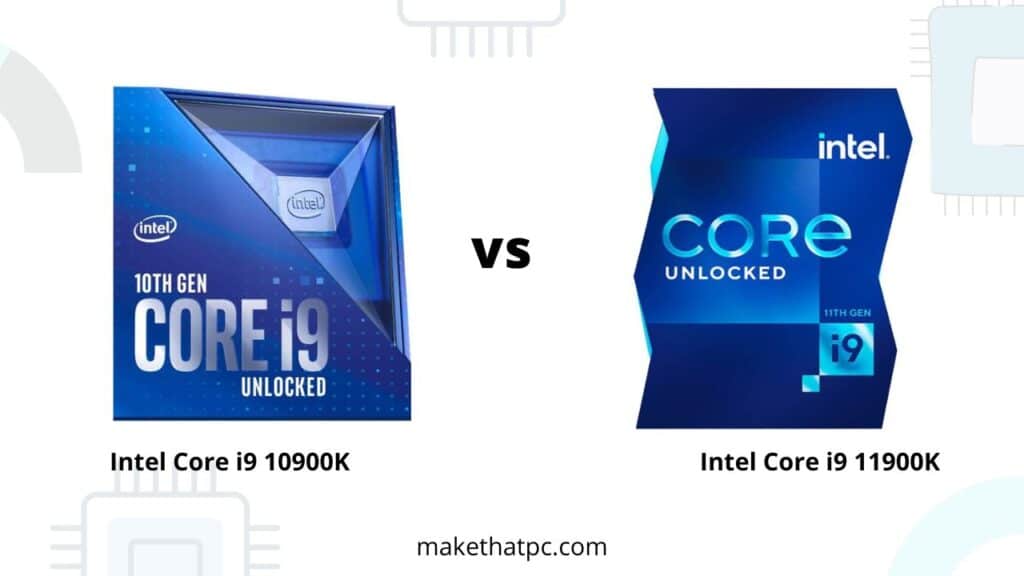
Theoretical Specification
| Specification | Intel core i9 10900k | Intel Core i9 11900k |
|---|---|---|
| CPU Generation | 10th Generation | 11th Generation |
| Cores/Threads | 10/20 | 8/16 |
| Base Clock/Boost Clock | 3.70/5.30 GHz | 3.50/5.30GHz |
| Cache | 20 MB Intel | 16 MB Intel® Smart Cache |
| Overclocking | Available | Yes |
| PCIe Version | PCIe 3.0 | PCIe 4.0 |
| Memory Support | DDR4-2,933 MHz | DDR4-3200 |
| Cooling Solution | No | No |
| Integrated Graphics Card | Intel® UHD Graphics 630 | Intel® UHD Graphics 750 |
| TDP (Thermal Design Power) | 125W | 125W |
The Core i9 10900K is based on the 10nm architecture and features 10 cores and 20 threads. It has a base clock speed of 3.7 GHz and a boost clock speed of 5.3 GHz, and it supports DDR4-2933 memory. The Core i9 10900K also supports Intel’s Hyper-Threading technology, which allows each physical core to handle two threads simultaneously, resulting in improved performance in heavily-threaded applications.
The Core i9 11900K, on the other hand, is based on the 14nm architecture and features 8 cores and 16 threads. It has a base clock speed of 3.5 GHz and a boost clock speed of 5.3 GHz, and it supports DDR4-3200 memory. Like the Core i9 10900K, the Core i9 11900K also supports Hyper-Threading technology.
So, overall, the number of cores and threads is higher in the 10900K. We will have to see which one is capable of offering better performance below in the benchmark section.
Synthetic Benchmark Scores (Comparison)
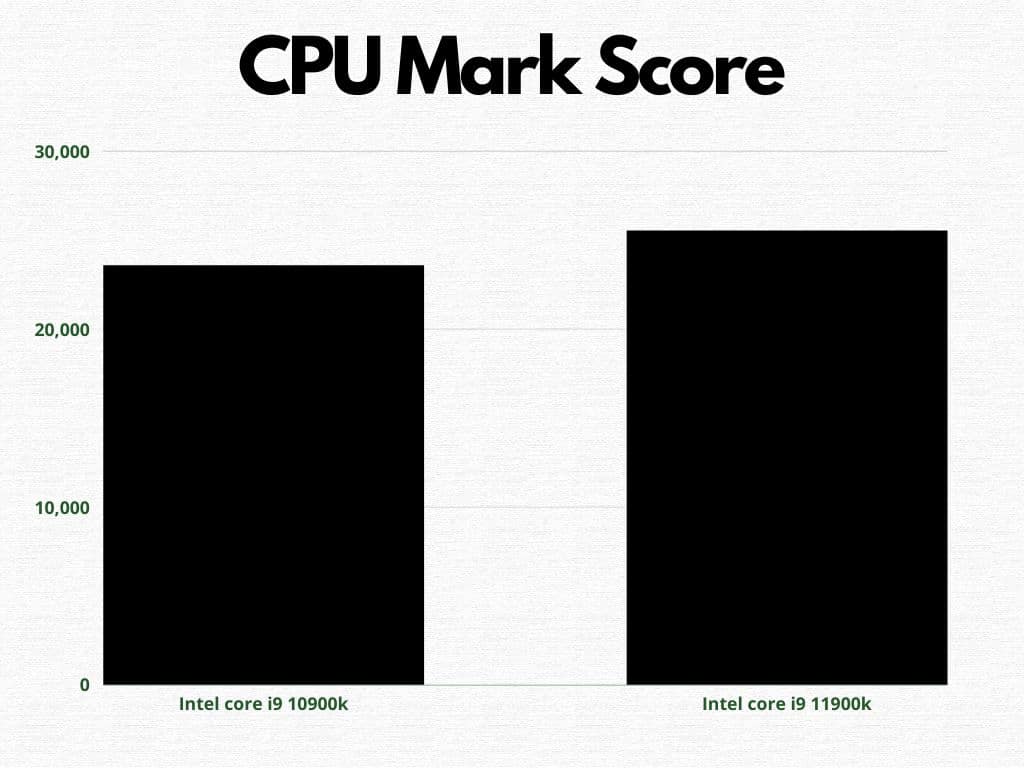
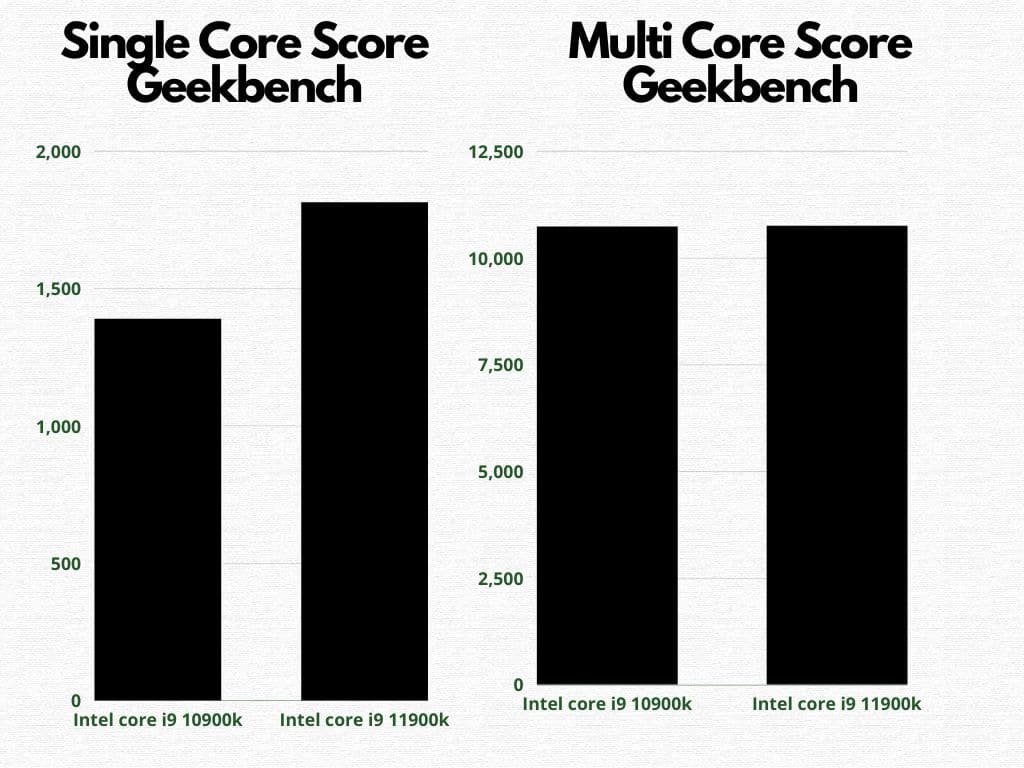
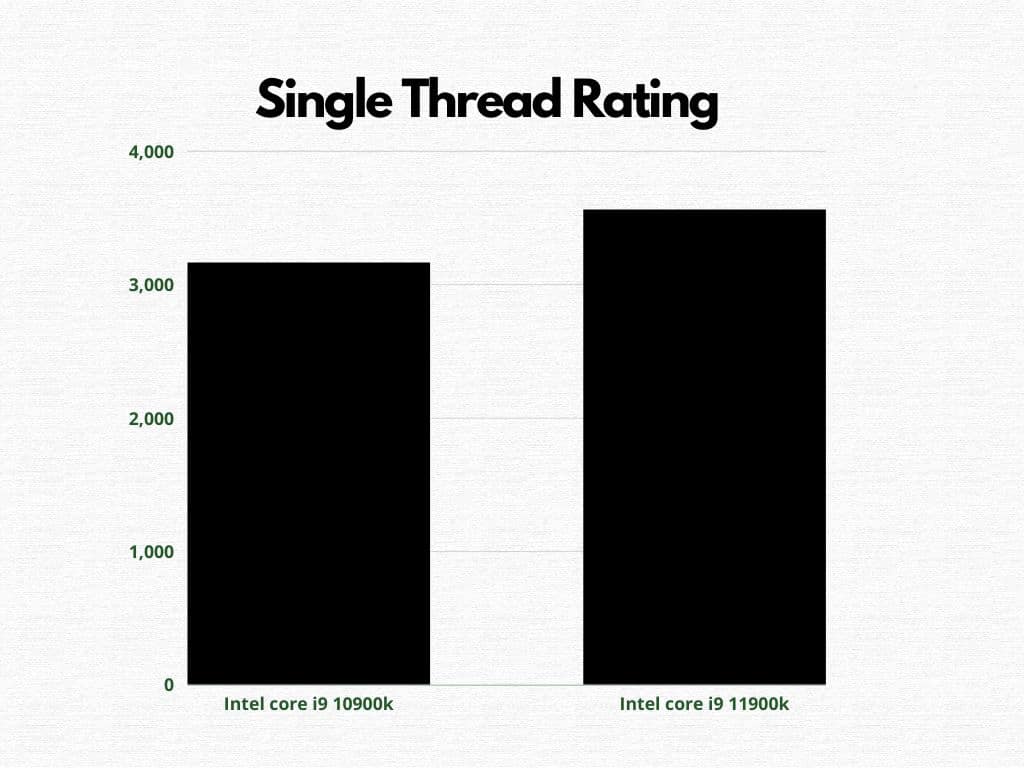
Cinebench Scores
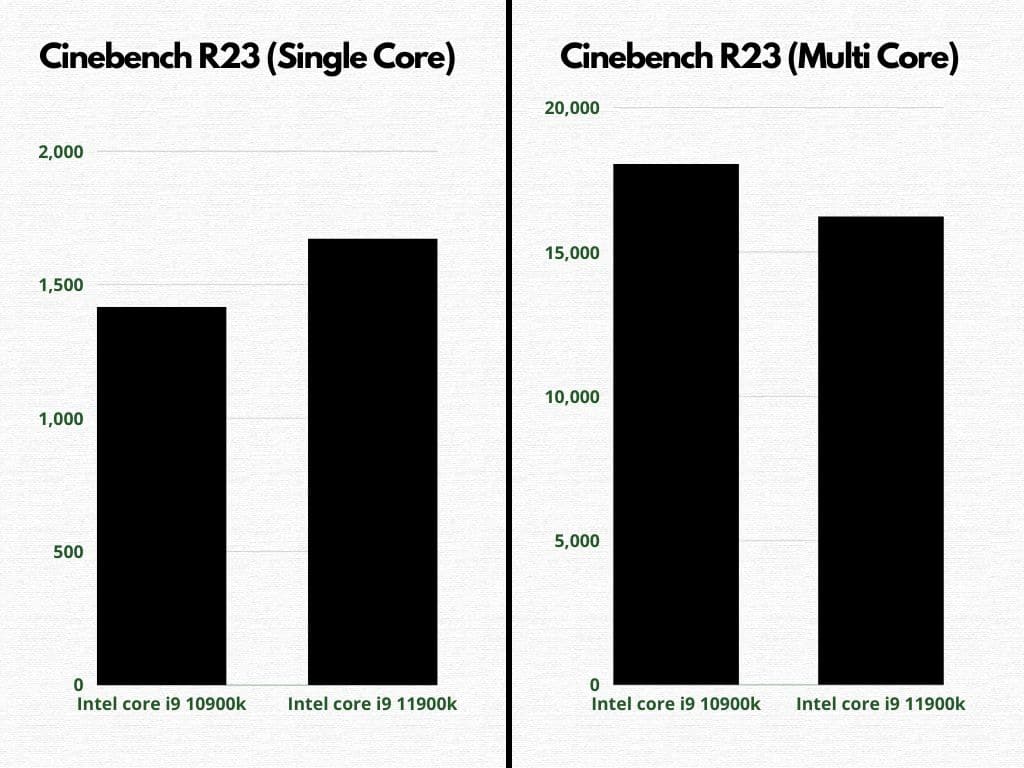
Cache Difference
The Intel Core i9 10900K and Intel Core i9 11900K are both high-performance processors that belong to the 10th and 11th generation of Intel’s Core i9 line, respectively. One difference between these two processors is the amount of cache they have.
The Core i9 10900K has 16 MB of Intel Smart Cache. The Core i9 11900K has 16 MB of Intel Smart Cache as well, but it also has an additional 2 MB of Intel Turbo Boost Max 3.0 cache, which is a type of cache that is used to store data and instructions that are accessed even more frequently.
Cache is a type of high-speed memory that is used to store data and instructions that are accessed frequently by the processor. Having more cache can improve the performance of a processor by allowing it to access data and instructions more quickly, as it does not have to go to main memory (RAM) as often.
In general, the additional 2 MB of Turbo Boost Max 3.0 cache in the Core i9 11900K may slightly improve its performance compared to the Core i9 10900K, especially in tasks that require a lot of data access. However, it is important to note that cache size is just one factor that can affect the performance of a processor, and there are many other factors that can also impact performance, such as the number of cores, clock speed, and architecture.
Memory Specifications
The Core i9 10900K supports DDR4-2933 memory, which refers to double data rate 4 (DDR4) memory with a speed of 2933 megahertz (MHz). The Core i9 11900K supports DDR4-3200 memory, which is DDR4 memory with a speed of 3200 MHz.
In terms of actual performance differences between the Core i9 10900K and Core i9 11900K, the additional memory speed of the Core i9 11900K may slightly improve its performance compared to the Core i9 10900K, especially in tasks that require a lot of data access. However, the actual impact on performance will depend on the specific workload and other factors such as the memory configuration of the system.
Clock Speed
The Core i9 10900K has a base clock speed of 3.7 GHz and a boost clock speed of 5.3 GHz. The Core i9 11900K has a base clock speed of 3.5 GHz and a boost clock speed of 5.3 GHz. The boost clock speed is the maximum clock speed that the processor can achieve under certain conditions, such as when the processor is running a single-threaded task or when the processor is not operating at its maximum power or temperature limits.
In terms of actual performance differences between the Core i9 10900K and Core i9 11900K, the slightly lower base clock speed of the Core i9 11900K may result in slightly lower performance compared to the Core i9 10900K in tasks that are sensitive to clock speed. However, the impact on performance will depend on the specific workload and other factors such as the memory configuration of the system.
Which one is suitable for gaming? 10900K or 11900K
In general, the Core i9 10900K may have a slight advantage over the Core i9 11900K in terms of gaming performance due to its higher base clock speed and higher number of cores and threads. However, the actual impact on gaming performance will depend on the specific games being played and the hardware configuration of the system.
You can see the actual gaming benchmark test results in the video below.
Now, it is clear that there is no huge difference in the gaming performance of both these CPUs. The amount of GPU bottleneck and the FPS levels are almost same with the both.
Which one is suitable for productivity? 10900K or 11900K
In my opinion, the 10900K is a good pick for productivity because of its higher number of cores and threads. Because the clock speed is almost similar in both, the 10900K will offer you some advantages because of the much more space for processing.
So, if your work included multitasking, video editing, 3D/2D modeling, programming, etc, 10900K will not only offer you better performance but also be a value-for-money option.
However, the 11900K is going to be much more energy efficient. So, both of these will have their own advantages but the 10900K is much better to pick here.
Price
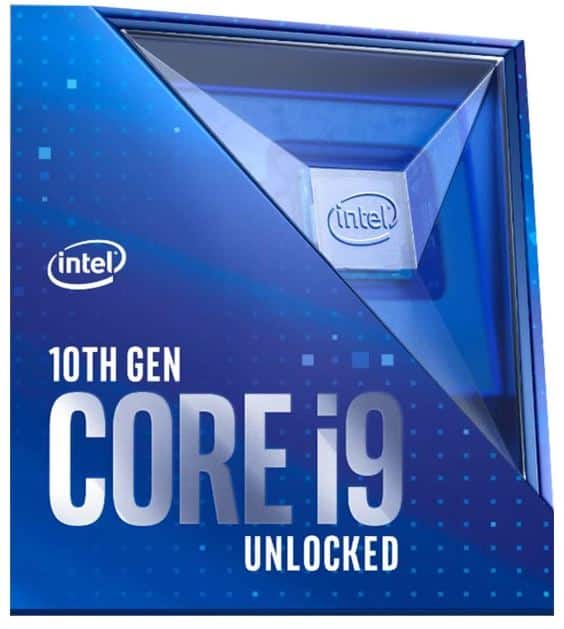
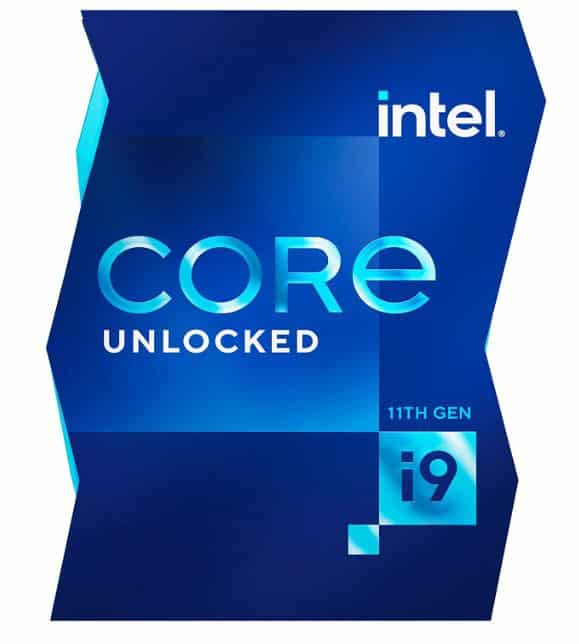
Which one to choose? 10900K or 11900K
The Intel Core i9 11900K is generally ~50$ more expensive than the 10900K. So, there is not a huge difference in the price. But, the 11900K is going to offer you a little better single-core performance. Also, it is more well-optimized and energy-efficient than the 10900K.
But, I don’t have any strong reason to suggest 11900K over the 10900K. If your work included heavy multi-tasking, for example, if you want to stream your gameplay, the 10900K can give you better results than the 11900K. So, the selection will depend on your usage. If you just want to play games, 11900K is the best. If multi-tasking is your goal, 10900K is definitely a good pick.
Let me know your thoughts in the comments!

I am Anshul Rana, an experienced author specializing in PC gear reviews and Windows 10 software tutorials. With a strong passion for technology and an in-depth understanding of the PC industry, I provide insightful and detailed analyses of computer peripherals, gaming gear, and software solutions. My writing style is concise yet informative, making complex topics accessible to both beginners and advanced users. Through my reviews and tutorials, I aim to offer valuable guidance, helping readers make informed decisions to enhance their PC experience and explore the vast possibilities of Windows 10 software.
